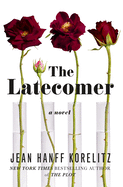
Jean Hanff Korelitz follows her wickedly clever novel The Plot (reviewed below) with The Latecomer, which may lack a traditional plot, yet has multitudes to recommend it just the same. By dint of her mastery of crafting a scene, Korelitz (You Should Have Known) manages to convince readers that whether characters find their peace matters as much as whether a character is, say, found guilty of plagiarism.
The Latecomer is narrated by Phoebe Oppenheimer, the younger sibling of the Oppenheimer triplets, who were conceived through in vitro fertilization in 1981. (Phoebe's "absurdly late appearance" nearly two decades later "screamed family crisis," as one of the triplets puts it, and fairly.) As if traumatized by their forced togetherness in utero, the triplets have--to their mother's enduring despair--spent their lives trying to get away from one another. Harrison railed against the liberalism of his secular Jewish upbringing in Brooklyn Heights and, rather than attend Cornell, his father's alma mater, opted for a conservative two-year college before moving to Harvard. Conversely, Sally and Lewyn went to Cornell, although so determined was Sally not to acknowledge her kinship with Lewyn that she didn't tell her roommate, who was dating him, that he was her brother.
Why all this intra-fraternal rage? That's what Phoebe is trying to figure out. The Latecomer can read like a collection of funny stories, with episodes that elucidate character and sparkle with dialogue-rich scenes that touch on politics, religion, race, privilege and sexuality, but they don't recalibrate the novel's path. That's okay: the occasional telegraphing from Phoebe can feel like a clarifying gut punch to happily unsuspecting readers. --Nell Beram, author and freelance writer

